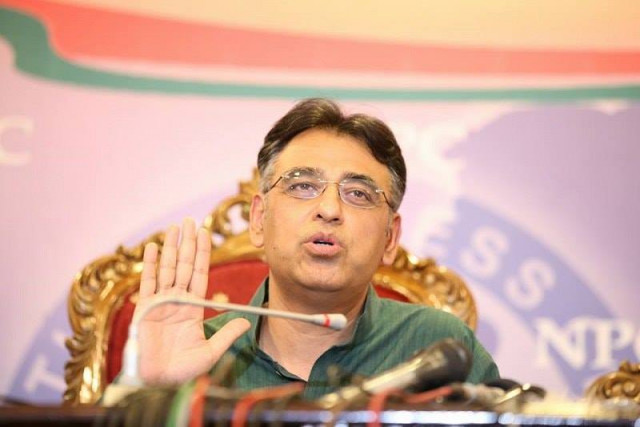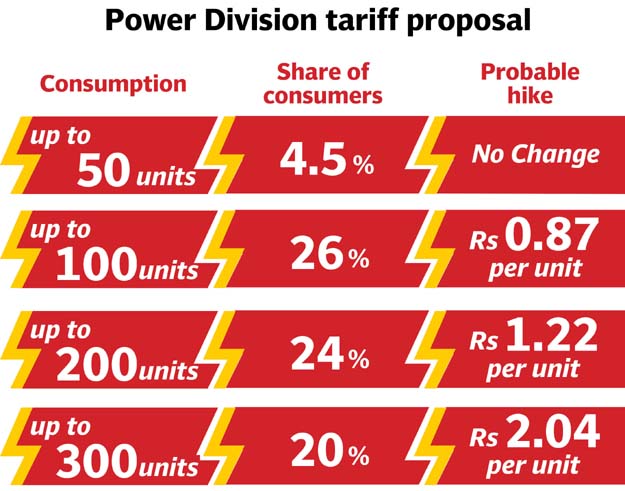ECC likely to approve up to 26% hike in power tariff
Price being revised due to rise in power generation cost and net hydel profit payment

Finance Minister Asad Umar. PHOTO: PTI
Officials of the Ministry of Energy (Power Division) said the power price hike was necessary because of the fresh tariff determined by the National Electric Power Regulatory Authority (Nepra) which was higher by Rs3.82 per unit.
The tariff is being revised upwards also because of the rise in the cost of electricity generation following addition of new capacity and increase in net hydel profit payments.
Despite the tough financial situation - circular debt of more than Rs600 billion and a minimal fiscal space - emphasis has been laid on protecting the interest of low and middle-income groups along with agriculture and industrial sectors.
The Power Division has proposed no change in the tariff for domestic consumers using up to 50 units per month who account for 4.5% of total consumers. Those using up to 100 units, who are 26% of consumers, may face an increase of Rs0.87 per unit, while those using up to 200 units, which are 24% of the total, may see a hike of Rs1.22 per unit.
For consumers using up to 300 units, who are 20% of total users, the tariff rise will be Rs2.04 per unit.
The Power Division has recommended the ECC not to hike tariff for agricultural tube wells. It has suggested a minimal increase for commercial consumers of up to 5 kilowatts, continuation of Rs3-per-unit subsidy for all industrial consumers and an additional subsidy for the export-oriented industry.

It has also proposed no change in the tariff for general services including schools and hospitals.
According to the Power Division, if no increase is made for any slab of domestic consumers, an additional subsidy of Rs82 billion will have to be borne. However, if no increase is made for domestic consumers of up to 200 units, then the additional subsidy impact will be Rs27 billion.
In the FY19 budget, Rs117 billion has been earmarked for the tariff differential subsidy. However, the revised subsidy will be Rs166 billion with an addition of Rs49 billion subject to no change in the tariff for up to 50 units, 15% change for up to 300 units and 20% for more than 300 units.
The Power Division wants to burden honest consumers, who are paying their bills regularly, with a payment of Rs200 billion on account of electricity theft. However, the economic managers want to recover these losses from defaulters and bring down power-sector losses to at least 16.3% as allowed by the regulator.
Finance Minister Asad Umar, while chairing an ECC meeting, had disagreed with Power Division’s suggestion of including the Rs202 billion worth of dues of the power sector, on account of losses caused by theft, in the proposed tariff.
Actual line losses in the power sector came in at 18.3%, but Nepra allowed the recovery of 16.3%, which resulted in an addition of Rs202 billion to the circular debt. The Power Division wanted to shift the 2% difference to the honest consumers.
Umar emphasised that only current losses of the power sector may be taken into consideration while determining the consumer tariff. It was also observed that the proposed tariff hike would place a significant burden on the consumers who had already been suffering due to increase in prices of essential commodities. Therefore, a careful decision was required to be taken on the issue.
The ECC chairman was of the view that it would be unfair to pass on the burden of losses to honest consumers, which stemmed only due to inefficiency and mismanagement on the part of power companies.
He was of the view that losses should be recovered only from the defaulters. He expressed apprehension over the incompetence of power companies, which failed to recover outstanding bills from the defaulters.
Published in The Express Tribune, October 16th, 2018.
Like Business on Facebook, follow @TribuneBiz on Twitter to stay informed and join in the conversation.



















COMMENTS
Comments are moderated and generally will be posted if they are on-topic and not abusive.
For more information, please see our Comments FAQ